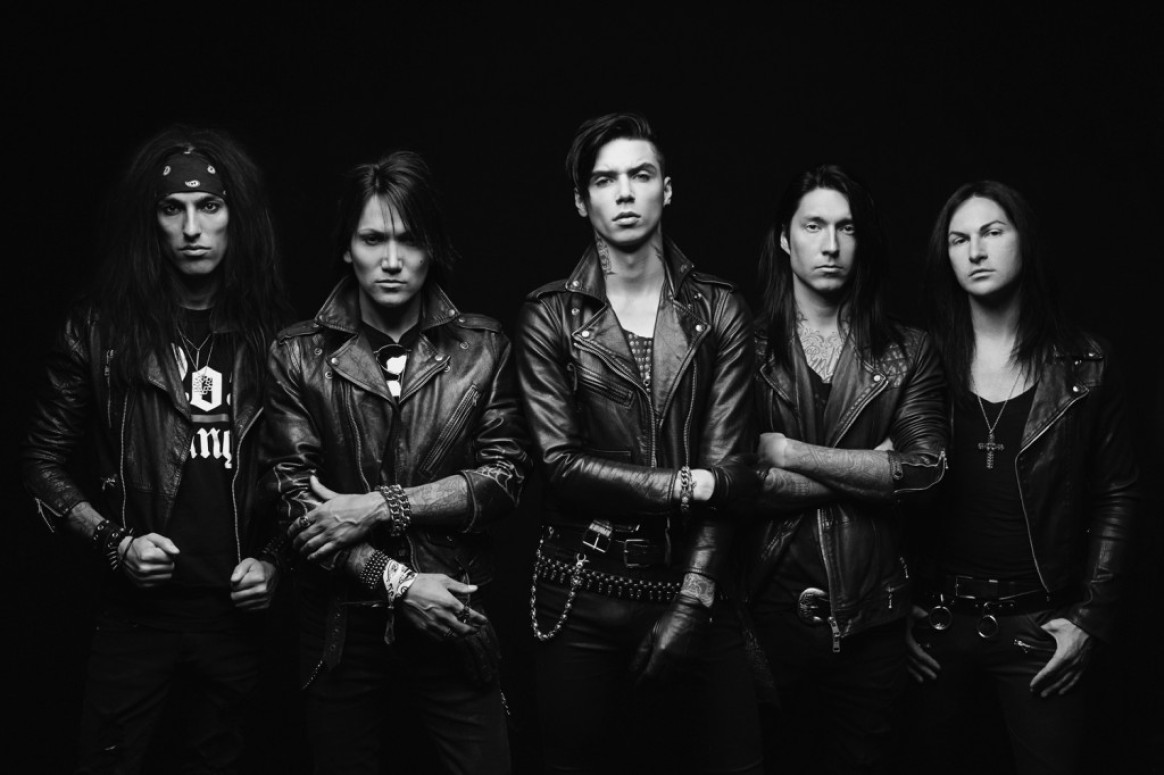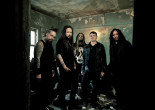Black Veil Brides frontman Andy Biersack has been quite the polarizing figure in the rock world since his band’s 2010 debut record, “We Stitch These Wounds.”
For starters, the band is often written off by “serious” metal fans as a somewhat “mallcore” alternative to their definition of what metal should be; the cushy “whoa, oh, oh” choruses and oft-perceived contrived, faux-glam, Mötley Crüe-circa-1981, Sunset Strip-lite throwback image only helps to fuel the fire of the metal elite’s often harsh stance on the Brides.
Then there’s the thumbing of the nose to the metal status quo, evidenced by the infamous rant that accompanied Biersack and the boys’ acceptance speech at the 2013 Revolver Magazine Golden Gods Awards, when the band took home a win for Best Song with their track “In the End.” Somewhat taken aback by the crowd’s less-than-enthusiastic response to the Black Veil Brides’ win, Biersack and company proceeded to pepper the “tough guy” denim-and-leather set with insults – not the best way warm the hearts of the Slayer-minded faithful.
Speaking by phone with Biersack, though, just a few days prior to Black Veil Brides’ show at the Sherman Theater in Stroudsburg on Friday, Nov. 21, all preconceived notions of a volatile, discretion-lacking Biersack were shattered. This was indeed a musician that is calculating in his career, aware of his connection to his legion of fans, and, dare we say, a witty conversationalist.
Black Veil Brides’ latest record (their fourth), the Bob Rock-produced, self-titled “Black Veil Brides,” had just hit Billboard at No. 10 when NEPA Scene spoke with the vocalist. Biersack, perhaps mistakenly pegged by some as the punk that sees record sales as meaningless and the business end of his craft as second to the artistry, was, in fact, an astute observer of his band’s marketplace foothold.
“If I said I wasn’t conscientious of the sales figures coming in, I’d be lying,” Biersack noted about the first-week chart debut. “It comes down to the fact that even though we know we aren’t going to be paid much for it because it is the record industry, we know that at least it’s there and people are purchasing the record to indicate some level of success and what the record’s going to do.”
Biersack went further to pull out some figures, observing that the first-week sales for the new record were down three percent from those of the band’s last record, 2013’s “Wretched and Divine: The Story of the Wild Ones.”
“We were anticipating selling to scale what we’d sold with our last record,” he begins, “and I’m very happy to know that we did.”
The sustained success of the new, self-titled Black Veil Brides record remains to be seen, but the album is noteworthy in that it was produced by the legendary Bob Rock – the man responsible for the larger-than-life audio wall achieved on landmark rock albums like Metallica’s “black” album, and Mötley Crüe’s “Dr. Feelgood,” among many. Interestingly, it was Rock that approached the Brides about working on new music.
“It’s not the greatest story when it comes to the press,” Biersack says with a laugh. “People want to hear that I slept outside his house for two weeks and begged him to make the record, but I just never really thought that somebody like Bob Rock would make a record with us.”
As it turns out, Rock was a fan of the Brides’ track “In the End” and had contacted the band about working with them. Biersack, however, realistic in his expectations and commercial views of the music world in 2014, thought working with the esteemed producer was a pipe dream, figuring that those days of a non-stadium band like the Brides working with a big-name talent was the stuff of past musical lore.
“Being a rock band in 2014, I liken it to being a rotary telephone salesman, or something like that – there’s not a lot of popular demand for it,” he begins. “When you’re looking at that as the base level interest of the average American, it’s not hard to imagine that there’s going to be a wall or a ceiling that you hit eventually as a band. Not like these older cats during the ‘80s and ‘90s, who might be viewed as somewhat untouchable, because they accomplished all these things before the bottom dropped out.
“Our relationship with many of our heroes has been like – they say, ‘I really like your music, but I wouldn’t want to be 24 and in a rock band right now [laughs].’”
Biersack notes that Rock simply took an interest in the band on a musical level, not having any idea as to the aesthetics of the Brides’ processes or even history. Eventually, Rock did some homework and found that he could be indeed be simpatico with the group, opening a line of communication with the Brides’ management.
“I got a call saying, ‘Hey, you guys want to go have breakfast with Bob Rock?” Biersack recalls. “The rest is kind of history.”
So how was it once band and producer were confined to the same room, with the wheels now in motion?
“I’d like to think of it as the first time that all band members agreed and meshed well,” Biersack says. “On our first record, we didn’t have a producer; our second record, we had a producer in title only – he didn’t really ever show up to the studio. For the third record, we worked with John Feldmann, which was a really enjoyable experience, but the problem was that we were recording very far away from everyone’s home. We had to drive a ways to get there, and everyone was begrudgingly coming in late at night or early in the morning. Living in downtown Los Angeles, that was about a two-hour commute each way [laughs] – there really wasn’t that sense of camaraderie.”
Rock insisted that the band stay together in a central location for the recording of the new album, bringing the band up to Vancouver, B.C., and furnishing hotels and meals while the band wrote and recorded as a cohesive unit. Biersack admits that this change of functionality was central to the vibe of the album and conducive to creating the new music.
“It really made things that much more enjoyable for us,” he says. “Really, everything was done together – the five of us.”
The new release, “Black Veil Brides,” continues the band’s lyrical foray into the dark topics of isolation, loneliness, fear, and ultimately, personal realization. Such subject matter has greatly influenced the demographic sway of the band’s audience toward the younger set. Biersack, though ingrained into his fans’ psyches as champion of such content, says that while the Brides have drawn upon that well of inner anguish, there is still no particular formula for a great Brides song.
“There’s an appeal in that feeling of community,” he relates when discussing the diehard fan base his band has cultivated upon the cornerstone of darkened life experiences. “It’s like when I was a kid and went to punk rock shows – I felt like I was a part of something. That’s the spirit we wanted to bring to the band, and that’s what we’ve always talked about as a band.”
There is, however, a perhaps unseen downfall in constantly dangling this type of material upon the listener that tends to suffer alienation.
“The difficult thing, within that context, is that you don’t want to become a salesman for the lonely,” Biersack realizes. “You don’t want to be convincing people that they should feel disenfranchised. You don’t want them to become attached just so they’ll buy more T-shirts from you or something. The only remedy is to talk about what it’s like to rise out of those situations, and try not to sell people on their anger or their loneliness. I think too many times bands get confused and think that there’s a surefire way to an audience – to create that feeling of loneliness.”
Biersack believes this route is a rather disingenuous heartstring on which to pull.
“The reality is, you shouldn’t want to be alone,” he explains. “Not necessarily join in, but to feel content within yourself. At the end of the day, that’s kind of our mission statement – to get people to feel that sense of community.”
Further elaborating on his style of songwriting, and the torment that is often contained within, Biersack explains his process in greater detail.
“I’ve always had trouble expressing, lyrically, moments that I’m currently experiencing,” he says. “I feel like it’s become too literal. It’s almost if you’re really angry and you sit down to write a song, all you’re going to write are fancy words to say that you’re angry, as opposed to if you have that emotion and you move past it, you tend to be a little more lyrical and poetic. At least that’s how my brain works.”
On the new record, Biersack was able to separate himself from much of his past experience, enough that reflection came much more elegantly.
“I was kind of able to go back to the previous year and a half that I’d spent prior to writing the lyrics,” he said of the album, “and look at my life and the things I’d been dealing with. In many ways, I was able to be more honest and open with it. The fact that we weren’t doing a concept record this time around allowed for a lot more exploration for me. It’s a lot darker in terms of lyrical narrative, I guess, but more than anything, I just try to write about things I know about.”
As polarizing a figure as he is within the metal “establishment,” Biersack and the Brides still manage to reap image-blind viewpoints within some heavy music circles. Revolver magazine, one of the bibles of contemporary metal coverage, recently put Biersack on its cover as part of a collection of acts the publication deems “The Future of Metal,” along with Chris Motionless of Scranton’s Motionless In White.
“I’m very appreciative that anyone would consider us to be the future of anything,” Biersack acknowledges of the magazine’s nod. “That means there’s a certain level of investment in our career, that we have the staying power to stick around. Whether that’s us being part of the future of hard rock or heavy metal, or whatever you want to call it, that’s certainly for someone else to decide. The specifics of all the rock subgenres anymore escape me; I can’t even keep up with it.”
Biersack likes to refer to the Brides as simply a “rock ‘n’ roll band” – nothing more, nothing less.
“There are the guitars and guitar solos – certainly heavy metal elements within it,” he says, “but I don’t claim any one specific genre. To me, it’s all derivative of what we were influenced by. You try not to be someone that’s ripping somebody off, but most of our influences were classic heavy metal bands or punk rock bands. To be qualified as a heavy metal band is great, but I’m happier to be considered a part of something that’s the future of a genre.”
They’ve been active for a relatively short amount of time compared to the decades-plus that their heroes have on them, but Biersack already sees growth within his band upon the release of their latest record.
“Most notably, I think we’ve just evolved as a group of individuals who play music together for over half a decade now,” he offers. “It’s impossible to not grow or mature if you’re tenacious enough and want to continue on. People rely on what they were good at, originally, and that might eventually fall apart. We’re tenacious; we want to continue on and write new things. We set out to make each record a different album and a different evolutionary step. I don’t know to what end that is, but people always ask, ‘Will that go on forever?’ I don’t know. I just know that, where we’re at right now, we enjoy making music together.
“I’m probably most proud of the fact that we’ve never made a record where we didn’t not like the outcome.”
So does that mean Biersack isn’t losing any sleep over what the naysayers think about his band?
“There’s a certain element that will look at a photo of us and already have their mind made up,” he admits. “But the reality of it is if people can also listen to a song and they know how they’ll feel about it, it’s very unlikely that they’ll enjoy it. The argument that, ‘If you just listened and gave them a chance,’ I don’t even know if that’s valid anymore. In a culture where the visual stimulus is so important to people, and their interest is really developed by what they’ll see on YouTube or social media, there’s a certain group of people that will just never like us. I don’t think it’ll ever be possible for people to just hear with their ears anymore.
“I used to get frustrated, but now I know that it’s a fool’s errand to try to change people’s opinion based on kind of nothing.”
with Falling In Reverse, Set It Off, and The Drama Club
Location: Sherman Theater (524 Main St., Stroudsburg)
Date: Friday, Nov. 21
Time: Doors at 6 p.m., show at 7 p.m.
Cost: $25 in advance, $29 at the door
Mark is a NEPA-based freelance music journalist and live music junkie, living vicariously through the artists he covers.




